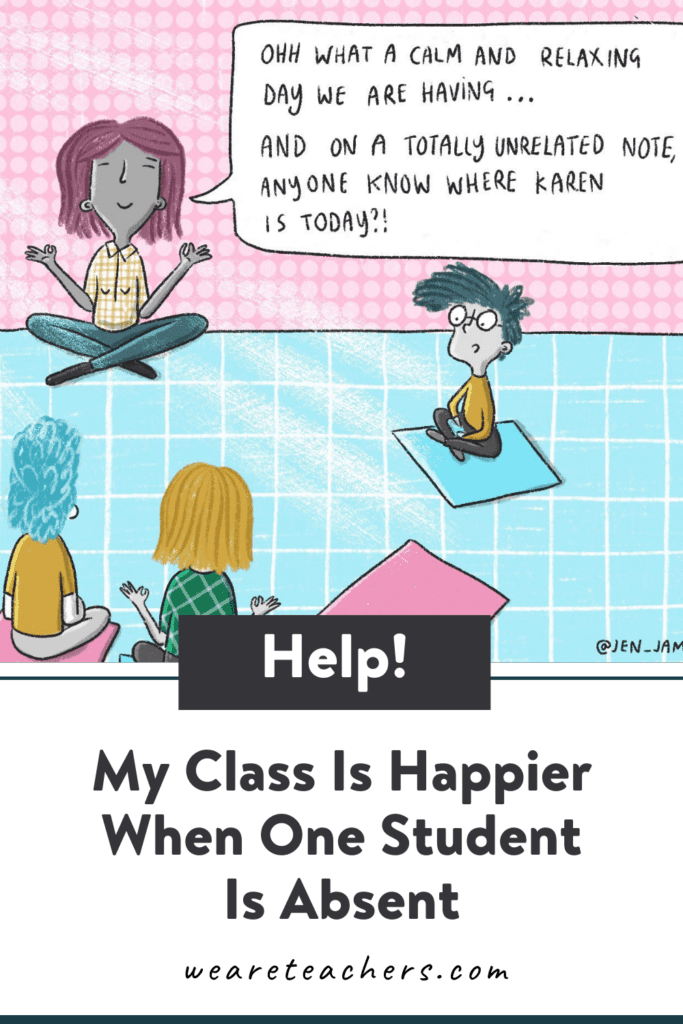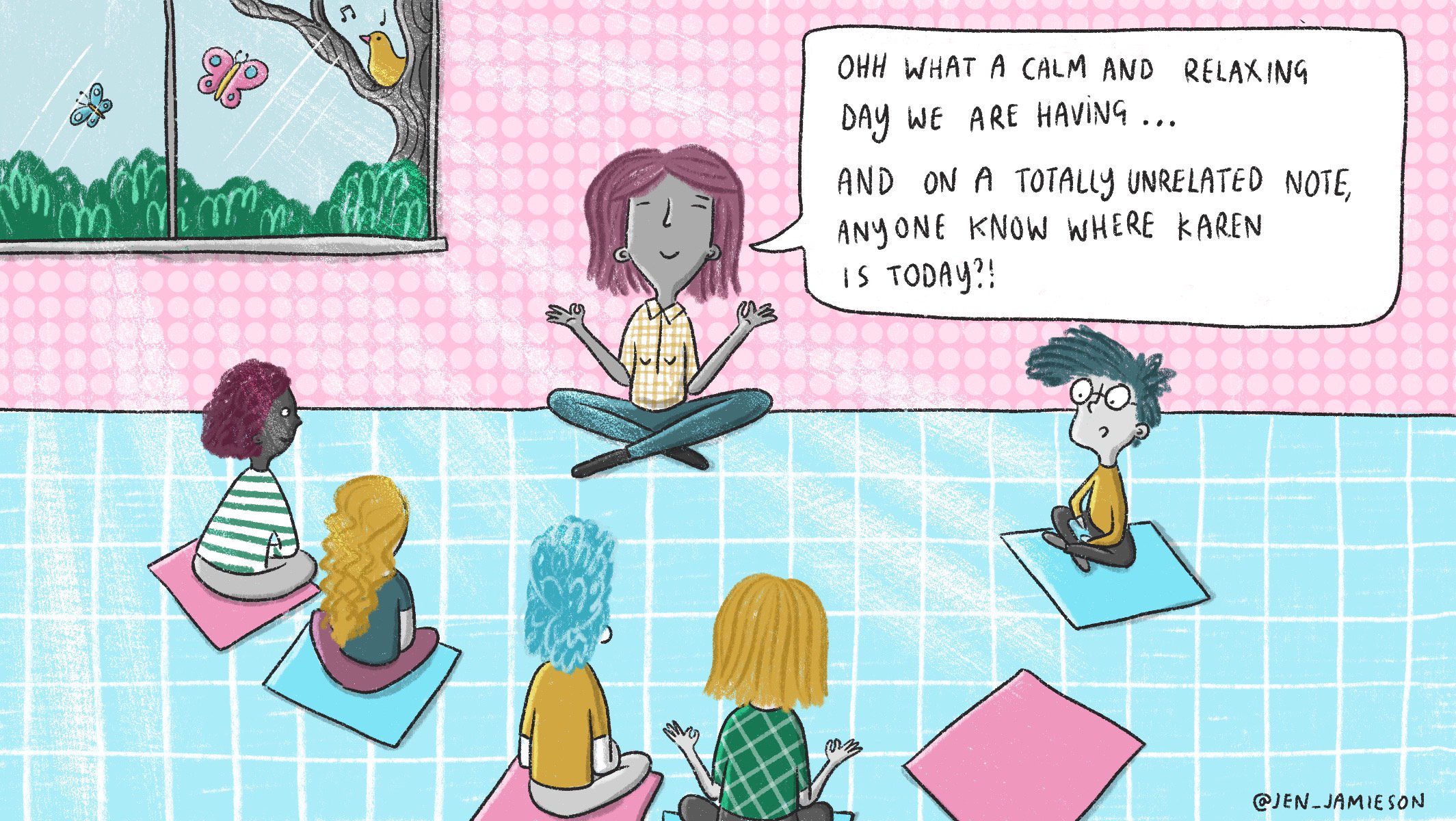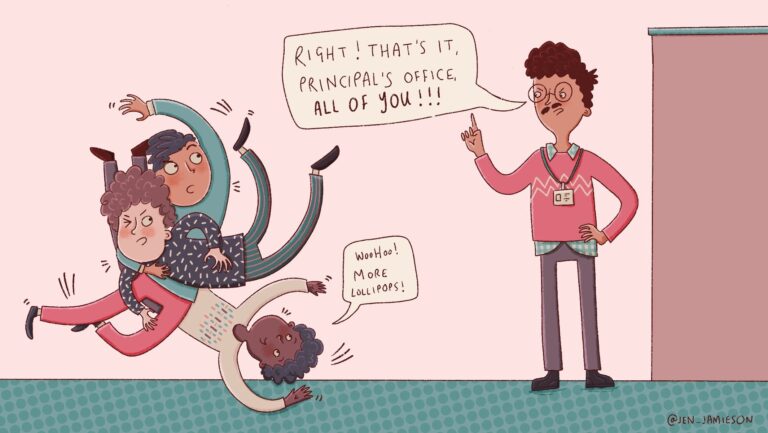Dear WeAreTeachers:
One of the sixth graders in my small class of 26 students has a huge impact on the vibe of the class. She is disruptive and argues with me and with other students. She complains about every project and assignment that we do. On days she is absent, my students get along better, and the day just generally goes better. My other students have commented that it’s so nice when Lexie (not her real name) isn’t here. I want my class to be positive and accepting of each other, but I also understand how they feel. How do I handle this? —Between a Rock and a Hard Place
Dear B.A.R.A.A.H.P.,
First, reflect on how your body reacts when things feel like they are falling apart. Does your throat constrict, jaw clench, heart race? Everyone will tell you to take a deep breath. Even though it seems obvious, do it anyway! Follow one single breath slowly in and out. Create a sense of calm the best you can. Breath focus is something you carry with you every minute of the day. The energy you bring to the classroom space is palpable, and you can help your body stay out of the fight, flight, freeze stress response. Work on maintaining a sense of calm amidst the chaotic moments. You are in it for the long haul, and your equanimity is golden.
It’s so tough when ongoing personality and behavioral issues negatively impact teaching and learning in the classroom community. Even though we make efforts to set up a classroom culture that is inclusive, positive, calm, and respectful, snafus spring up on a daily basis. And it sounds like the issues have evolved into a geyser. This can make the whole classroom tremble at its foundations. Let’s dive into some strategies to try with Lexie and the rest of your class.
Tap into the support systems at your site. Communicate with your leadership and parents, share your documentation notes, and welcome the support you need and deserve. It’s not weak of you to ask for help. Set up a buddy system with a nearby team partner so Lexie has a place to go when things are escalating and when she would benefit from a break.
Establish co-constructed classroom rules together to promote buy-in. Chart the rules and have the students sign their names. Keep them visible and follow through with your management system. Even when it would be easier to look the other way and avoid, resist that urge. Follow through when Lexie, or anyone, is pushing the limits. Michael Linson wrote, “When you have a difficult student in your classroom who you’ve emboldened with your appeasement and inconsistency, and who now saunters around your classroom as if rules don’t apply, you must find the inner strength to say, ‘Enough is enough.’“
It’s your job to help Lexie and the rest of your class learn from mistakes, and Ruth Charney is masterful in building capacity for respectful, relevant, and realistic logical consequences. Charney goes further and offers three examples of logical consequences, including you break it you fix it, loss of privilege, and take a break time.
Last but not least, talk to the whole class and acknowledge the feelings and frustrations you are noticing from your students. Remind your class that, over time, their ability to understand and take the perspective of another person is part of living and working together in a community. We won’t all be best friends, but we will learn to relate to each other’s varied emotions and perspectives to build empathy. Meeting regularly with Lexie and learning about her life, processing the behaviors, and setting doable goals needs to happen regularly. Progress may seem microscopic at first, and some ideas may work better than others, but the important thing is to follow through and persevere.
Dear WeareTeachers:
I’m studying to become an elementary teacher. I’m really excited about what’s to come, but I have so many insecurities and doubts. The workload in my teacher education program is already intense. All the big high-stakes assessments are stressful. Worries pop up all the time for me. What if I don’t get along with my guide teacher? What if the kids don’t like me? I’m going into debt, too. Is this all worth it? —Worry Waterfall
Dear W.W.,
Welcome to one of the most rewarding and deeply challenging callings in life. Yes, your role as a student teacher will stretch you outside of your comfort zone and spark vulnerability and courage. But with the disequilibrium, you will learn so much about yourself. I find being in the moment with children who make wonder and curiosity to be big-time uplifting.
I’ve been supervising and teaching classes for pre-service teaching candidates for over 15 years at the University of California San Diego. I can confidently say that most students share your concerns! The thing is, the pursuit of challenge lessens when you are supported and feel part of a community. So, invest in your relationships with other student teachers and the faculty. Take the time to get to know each other, whether it’s by setting up carpools, sharing meals, or problem-solving together. You have a support system to lean on to get through this one step at a time.
Yes, teaching programs are demanding, and I can’t emphasize enough that you need to get yourself organized. Keeping up with your assignments and all the steps involved in completing the complex assessments is no joke. To do more than just get by requires setting up timelines for assignments for projects, consistently keeping your calendar up to date, setting reminders, and having solid time management.
The field placement is where so much of the magic happens in your early development as a teacher. Get to know your students well! Be curious about their lives. When the kids know that you are interested in them and care about their lives, you will establish trusting relationships. Soak up the role of apprentice. It’s a unique time in your career where you have a lot of observation time and a gradual build in responsibility. This is the time to embrace that theory without practice is useless, and practice without theory is dangerous.
As far as your concern about establishing a positive relationship with your mentor teacher, start with exquisite communication. Respond to texts and emails, take initiative, and be open to varied perspectives. Ask questions to gain understanding before jumping to conclusions. Show authentic interest in learning about the classroom routines, and remember that you are a guest in the classroom. There may be times when you imagine yourself handling situations differently. That’s reflective and beneficial to your growth!
Talk about concerns with your supervisor and mentor teacher when they emerge. And they will! Carry yourself in a professional way, and when things just feel like too much, don’t wallow and withdraw; reach out. Adjustments can be made to help you rise up and keep moving forward. No one is expecting your development as a teacher to be perfect. We are expecting you to be prepared, reflective, and kind to yourself and others as you take risks and learn from the bumpy times.
Here’s some advice about the teaching profession that is relevant for new and more experienced teachers. “Constantly remind yourself why you are in the profession. You’re not going to get rich, there are going to be more headaches than you anticipate, and there are going to be times that you tell yourself ‘it’s not worth it.’ If you keep in mind the kids you’re reaching and the difference you can make in one kid’s life, it will be worth it. Focus on your success stories, and don’t focus on the kids that won’t allow you to reach them (for whatever reason). And write down the funny stuff that happens. It’s good to have a drawer full of those things when you’re having a bad day.” —Aaron Frazee, high school social studies teacher
Dear WeAreTeachers:
I’ve gotten written up, and it doesn’t seem fair! I’ve been accused of singling out of one of my 4th-grade students by asking her to sit in the hallway after disrupting others. I feel like it’s a CYA move by my principal to save face with parents who scolded her for “sweeping their concerns under the rug.” Yes, I’ve been in touch with my union reps. They’re not helpful. The parents are furious and were absolutely rude to me during our parent conference. My principal was in the meeting too and told me to stop talking twice. The parent raised her voice at me, saying, “NO, HONEY, I’m talking right now” while I was trying to explain the situation that happened. The principal told me that this is the absolute worst, and by far, most unprofessional behavior she’s ever seen from a teacher. I’m supposed to write my rebuttal for the write-up. What should I say? —Don’t Call Me Honey
Dear D.C.M.H.,
This sounds like a tenuous situation and a major energy drain. When you don’t feel like your leadership has your back, it’s super stressful. Your voice was stifled during the parent conference, and it was patronizing for the mother to call you “honey.” That comment shows such little regard for you. You don’t deserve that. And hearing that your union reps aren’t rising up makes the whole context even more intense. So, what’s next? What options do you have?
Tap into your inner investigative reporter and try and find out which class the student was in last year. If you haven’t already, start documenting what is going on right away! Sometimes we think we will be able to remember, but our brains are like sieves, and details start falling away. As you craft your rebuttal, try and keep your ideas as descriptive and objective as possible. Be sure to explain why you made the decisions you did as the situation unfolded. Be sure to steer clear of language that is inferential and emotionally charged.
When you jot down what happened with the student, be sure to include as much as you can remember about what happened before the student was asked to take a break in the hallway. Have one-on-one talks with other students to see what they remember. Try and connect the decisions you made to the classroom management system you have created in your classroom. Show how this decision was a result of the logical consequences of your agreed-upon management system. Also, infuse sentiments that show you are reflective, open, and receptive to feedback. After writing the rebuttal, consider sharing with someone you trust for feedback. Another pair of eyes will be helpful.
For the immediate future, don’t engage with the parents on your own in any way, shape, or form. Put your ideas in writing, and if you need to meet with them, find someone else to join you besides the principal who perpetuated the disrespectful interactions. You might want to explore having this student switched from your classroom if possible. It could be beneficial for all involved.
Also, this may be one of those times when you start networking and looking for other work opportunities. It’s going to be a long haul to have such an adversarial relationship with your principal. Yes, it’s true, principals are human beings, too, and they make mistakes like the rest of us, but when that meeting escalated and felt confrontational, the leadership should have stepped up. Meanwhile, what will you do to take care of yourself? My self-care has a healthy dose of poetry. I hope American poet Mary Oliver inspires you to find your voice on The Journey of life.
Dear WeAreTeachers:
Would it be so bad to ignore the kids on their cell phones or with earbuds? I’ve always been the “bad guy” in my classroom. While co-teachers say nothing, I’m the one fighting to get the kids to put their technology distractions away. I’ve tried the charging station, points deducted, calling home, collecting phones. Nothing works. I’m now tired. Just tired. I’m thinking I’ll do an experiment on Monday to see what happens if I just ignore the cell phones and hats and earbuds, the talking, the copying each other. What if, for one day, I just don’t discipline the class? I’ll hand out the work and not say anything. What’s the worst that could happen if I just ignore it all? — Looking the Other Way
Dear L.T.O.W.,
When teachers are united and in sync, it’s so much easier to shape student behaviors. It sounds like you are shoveling snow by yourself in a blizzard. That’s exhausting! Technology has become a prominent part of all of our lives. It’s almost as if phones and earbuds are extensions of peoples’ bodies, and it’s incredibly hard to dislodge them. When we work so hard as educators and don’t see the progress we are hoping for, we feel tired and fed up, which can really weigh heavy on our spirits.
When you wrote that “nothing works” and that you are tired and considering withdrawing, it made me think of the characteristics of teacher burnout. Psychology Today defines burnout as “a state of chronic stress that leads to physical and emotional exhaustion, cynicism, detachment, and feelings of ineffectiveness and lack of accomplishment.” There is a lot being written about teacher burnout and feelings of powerlessness. The ripple effect of COVID-19 is no joke! In addition to thinking about ways to offset burnout with things that nourish you, it’s also important to think about the root causes of exhaustion.
There are problems with stories of teacher burnout because teachers are told to find ways to relax versus addressing the discontent in the system. In your case, some root causes may be related to the lack of support, cohesion, and consistency between your grade level team and other colleagues. Or maybe a deeper issue has to do with the negative effects of technology and figuring out how to get students to understand the pitfalls and learn ways to have a healthier relationship with technology. Teachers often feel demoralized because our workspaces and our values are not aligned.
Although I’m the first to acknowledge that I avoid things in life and sometimes put my head in the sand, it’s not the best plan of action for making progress. If you decide to ignore the behavior that is getting in the way of learning, then you are sending the message that you endorse it. The kids need you to be consistent with your messaging and follow through. With that said, maybe it’s worth talking to your students about when it might be appropriate to use their phones or earbuds. I personally love working with mellow instrumental music playing in the background.
Invest in your classroom community, and remember that establishing routines and rules is not just for the beginning of the year. As issues arise, we adjust and continue on our way with strategic redundancy. There is an image going around on social media that says, “No Phone November.” Maybe you’d like to give these steps a try? First Use: Warning. Second Use: Bag it and give it to the students. 3. Ongoing Use: Office pick-up.
Do you have a burning question? Email us at askweareteachers@weareteachers.com.
Dear WeAreTeachers:
It feels like my brain broke last year and hasn’t recovered. I’m having a hard time motivating myself to give my all. When my kids are in the room, I’m doing better. But planning? Grading? Material creation? That’s where I drag. I spend prep time working so slowly, sometimes having a break for a snack or just for a break. I can’t mentally force myself to go faster. I’m just big-time tired. How can I get through this slog?
Love our advice column? Visit our Ask WeAreTeachers hub.
Illustration: Jennifer Jamieson


